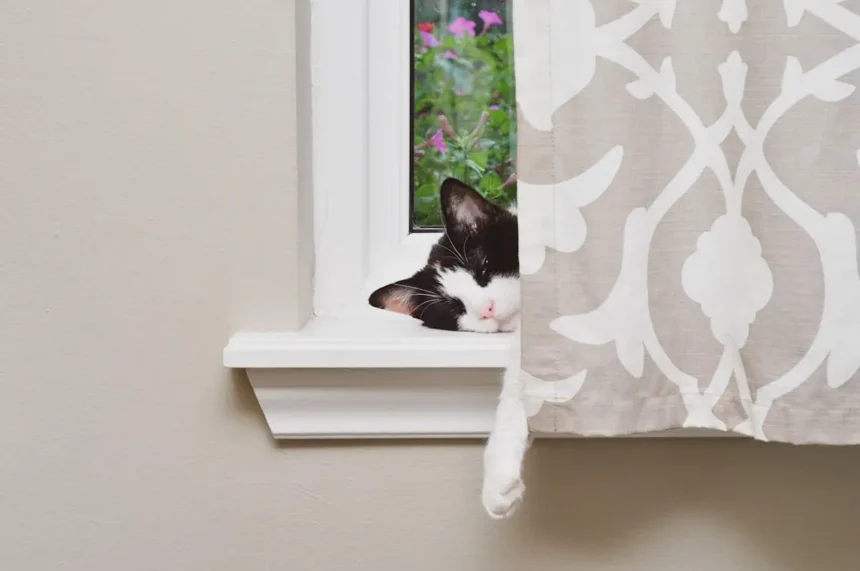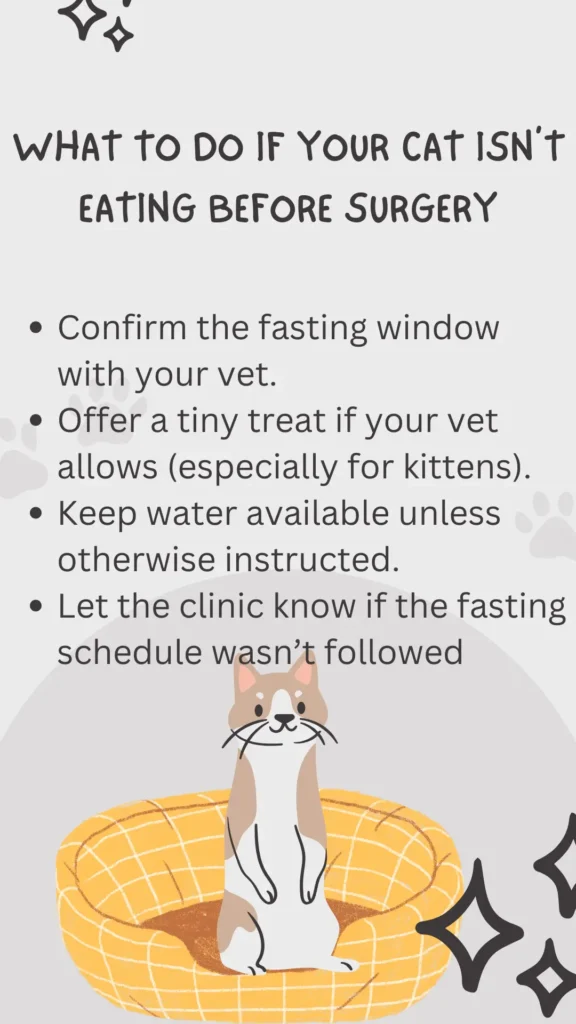If you’re a cat parent, surgery day can be stressful. And if your cat refuses to eat before the procedure, it can raise even more concerns. Don’t worry – we’ve got you covered with everything you need to know.
Why Do Cats Need to Fast Before Surgery?
Before anesthesia, cats are typically required to fast. Why?
- Prevent vomiting under anesthesia: If a cat vomits while unconscious, it could aspirate (inhale) food into the lungs, leading to life-threatening pneumonia.
- Clear stomach for anesthesia: An empty stomach reduces complications during surgery.
How Long Should a Cat Fast Before Surgery?
- Healthy adult cats: Usually fast for 6–8 hours before surgery.
- Older protocols: Previously recommended 12 hours.
- Kittens and underweight cats: Often allowed a small snack 1–2 hours before surgery.
- Special cases (like diabetic cats): Fasting instructions vary. Always ask your vet.
Can Cats Drink Water Before Surgery?
Most cats can drink water until 1–2 hours before surgery. Keeping your cat hydrated is important. Some vets may ask for water to be withheld earlier in specific cases.
My Cat Refuses Food Before Surgery – Is That Normal?
Yes, it can be completely normal. Cats may: – Sense something is different (e.g. travel box, stress) – Feel anxious and avoid food
Some clinics may allow a tiny snack (like a small meatball) if the fasting window is too long.
Risks of Over-Fasting
Fasting a cat too long can cause:
- Dehydration
- Low blood sugar (hypoglycemia) – especially in kittens or diabetic cats
- Excessive stress
If your cat fasted earlier than advised or refused food too soon, notify your vet. They may adjust the schedule.
What to Do If Your Cat Isn’t Eating Before Surgery
Here’s what you can do:
- Confirm the fasting window with your vet.
- Offer a tiny treat if your vet allows (especially for kittens).
- Keep water available unless otherwise instructed.
- Let the clinic know if the fasting schedule wasn’t followed.
What Happens After Surgery?
After the anesthesia wears off:
- Your cat may take a few hours to regain appetite.
- Start with light, bland food in small amounts.
- Most cats resume eating within 24 hours.
- No eating after 48 hours? Contact your vet immediately.
Pre-Surgery Feeding Summary
| Scenario | Food Fasting Duration | Water Allowed Until |
|---|---|---|
| Healthy adult cat | 6–8 hours | ~1–2 hours before surgery |
| Older protocols | 12 hours overnight | Until morning |
| Kittens/underweight cats | 1–2 hours; small snack | Often until surgery |
| Diabetic/special cases | Vet specific | Vet specific |
Frequently Asked Questions (FAQs)
My cat hasn’t eaten in over 12 hours before surgery. Is that dangerous?
Yes, for some cats it can be. Over-fasting can lead to low blood sugar, especially in kittens or diabetic cats. Let your vet know – they might allow a small snack or adjust the surgery time.
Can I give my cat treats the night before surgery?
You can usually give treats until the cut-off time set by your vet, often 6–8 hours before surgery. Always confirm with your vet.
What if my cat drank water a few hours before surgery?
Most cases, this is safe. Cats are often allowed water until 1–2 hours before surgery. However, if unsure, call your clinic.
Should I force-feed my cat if they won’t eat before surgery?
No. Never force-feed a cat, especially before anesthesia. It can cause vomiting or stress. Let your vet know about the issue.
Is it okay if my cat eats just a little before surgery?
Depends on the vet’s fasting guidelines and your cat’s health. For kittens or underweight cats, small snacks may be allowed. Always follow veterinary advice.
What can I do to make fasting easier for my cat?
Keep them calm, avoid food scents in the house, and separate them from other pets who might be eating.
Final Thoughts
Fasting is an important safety step before surgery, but if your cat refuses to eat, don’t panic. Focus on following your vet’s instructions, and know that a little hesitation around food can be normal.Need more advice on pet care before surgery? Follow us at PawBlooms for trusted pet wellness tips! 🐾


